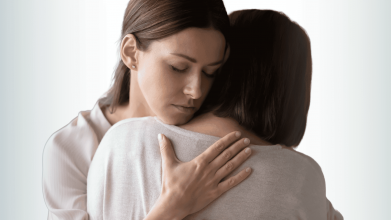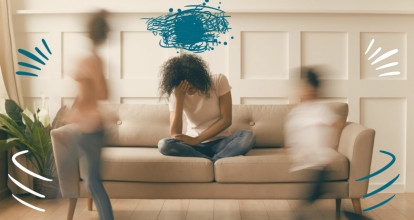Curtis Chang: It’s not like we have to get rid of anxiety and then we can be at home with the Father and the Son and the Spirit. Actually, the Father, the Son and Spirit come to make a home with us in our anxiety.
John Fuller: Well, that’s Curtis Chang, and he joins us today on Focus on the Family with Jim Daly. I’m John Fuller.
Jim Daly: John, when it comes to mental health issues, anxiety is right at the top of the list. And, you know, I think post-pandemic, there are a lot of people that are struggling. There were people struggling before, but a lot more people are struggling now with this issue of anxiety, both in the church and outside the church. And, uh, it’s something that I feel it would be very good of us to cover and to better understand what is happening with anxiety. And sometimes, we could say some things in the Christian community that are so unhelpful to people that are dealing with anxiety.
John: Mm-hmm.
Jim: And I want today and tomorrow’s program to, uh, kind of highlight for us what it is, what we can do to use it to become better and closer to the Lord, which-
John: Mm-hmm.
Jim: … is everybody’s goal, right?
John: Right.
Jim: And we have a great guest who’s gonna help us with this.
John: Yeah. And as I said, Curtis Chang is joining us. He’s a writer, speaker, and theologian, and had a terrific book. It’s called The Anxiety Opportunity: How Worry is the Doorway To Your Best Self. And you can learn more about our guest and the book at focusonthefamily.com/broadcast.
Jim: Curtis, welcome to Focus on the Family.
Curtis: It’s great to be here.
Jim: You know, we’re gonna get to your personal story, ’cause what I so appreciate about who you are is you’re a person who has struggled with anxiety. And so you’re coming not only from a theological perspective, but from someone who had to do that. But before we get there, uh, comment on just the general situation with anxiety and the culture. You know, when you look at data and research, which we do here at Focus on the Family, this is, uh, a continually rising issue in our culture. How many of the Gen Z’ers are struggling with anxiety? It, it should concern all of us.
Curtis: Absolutely. I think any listener to this show prob- almost certainly either in their own family or extended family or friends in church has a child, a teenager, or even adult-
Jim: Right.
Curtis: … who’s struggling with anxiety. The latest NIH statistics shows, um, almost 60% of teenage girls suffer from very significant anxiety or depression.
Jim: Hm.
Curtis: One in four have contemplated committing suicide because of how serious that condition is.
Jim: Think of that, one-
Curtis: Yeah, yeah.
Jim: … in four. Stop and just rest there for a minute. That’s 25%.
Curtis: It’s an amazingly high number and should cause us to re- recognize something is wrong that we need to address.
Jim: When you look at it… Um, you and I met at a conference, and I heard you speak. And I came back to the team and said, “We’ve got to get Curtis Chang (laughs),” ’cause I, first of all, I really appreciate the title of your book, The Anxiety Opportunity: How Worry is the Doorway To Your Best Self.
Curtis: Yeah.
Jim: You said something at that conference that really caught my attention. It was the west and the way the church and western medicine particularly, uh, misses the mark in going after anxiety.
Curtis: Yeah.
Jim: Describe that for us again.
Curtis: Yeah. Uh, well I would say both the west secular mental health, but also the west church, evangelical church in particular, um, we need to make an adjustment here because what we’re doing is not working. And what we’re… What’s not working is both the church and secular mental health, are treating anxiety solely as a problem-
Jim: To solve.
Curtis: … to, to make go away.
Jim: Yeah.
Curtis: Right, ’cause once we s- define something at solely a problem, we are, like, looking for a solution-
Jim: Mm-hmm.
Curtis: … to make it go away. So in the church, this is where you get, in a lot of traditions, the pray anxiety away. Just have enough faith, and anxiety’s supposed to go away because anxiety’s a spiritual problem. It’s either, in extreme cases, a sin, or maybe just a lack of faith, or a character flaw. So we’re supposed to pray, read enough scriptures, and anxiety’s supposed to go away. In other church traditions, maybe they don’t spiritually stigmatize anxiety, but they still then just outsource anxiety to secular mental health and just say, “Well, we’ll refer to the secular therapist, psychologist,” and so forth. And in that tradition, it has its own version of solely treating anxiety as a problem to go away. Rather than pray anxiety away, it’s prescribe anxiety away-
Jim: Mm-hmm.
Curtis: … either with medication or therapy, which just to be clear, both prayer and therapy and medication, I have done, I’m a fan of. But when you engage that with this idea, this paradigm, this framework that says anxiety is solely a problem to go away, you go down a path that actually makes anxiety worse.
Jim: Hm. No, that’s interesting.
Curtis: Yeah.
Jim: Let, let’s, uh, kind of reveal your childhood-
Curtis: Yeah.
Jim: … and what you were struggling with, and take us through that. What was childhood like, and where did that anxiety start?
Curtis: Well, I think my anxiety started in a lot of ways, but what’s interesting is in my childhood, uh, I didn’t have any terms or categories to label what I was experiencing anxiety. I grew up as an immigrant family in a Chinese/American culture. So, uh, in that sort of traditional immigrant culture, the response to a child feeling anxious is don’t be so anxious, you have nothing to worry about-
Jim: (laughs)
Curtis: … or just work harder.
Jim: Yeah.
Curtis: Study harder, right? Um-
Jim: Well, performance is big.
Curtis: Performance is big, and there’s just not a category for anxiety. And anxiety in a sense brings on shame-
John: Hm.
Curtis: … for the family, that there’s something wrong with the family. And so growing up, um, I actually was an anxious child, but I just didn’t have any categories for it. And another reason why I think in addition to the cultural reasons was I adopted what psychologists call highly-functional anxiety. So what highly-functional anxiety is, there’s actually deep anxiety going on, but the person, myself in this case, has learned very functional behaviors to cope and cover over-
Jim: Compensate-
Curtis: … a least temporarily compensate for the anxiety. So for me, it’s planning, thinking ahead, working very hard, which turns out if you do those things, you get ahead in the world-
Jim: Yeah.
Curtis: … but the anxiety is still there. And it’s actually in a way, a hidden engine for a lot of these behaviors of just really staying on top of things.
Jim: Right.
Curtis: Yeah.
Jim: Part of it-
Curtis: Yeah.
Jim: … in the story that I’ve read is-
Curtis: Yeah.
Jim: … you know, you were what is called a latchkey kid.
Curtis: That’s right.
Jim: Descri- describe how that aided your anxiety.
Curtis: Right. So again, I’m an immigrant, uh, immigrant family. So both parents are working. So, uh, even as young as eight years old, I’m coming home from school, uh, and this may not be familiar to all younger listeners, but there’s a thing called a latchkey kid, where-
Jim: Yeah, right (laughs).
Curtis: … even as young as eight years old, you would go home and you would get a key from the latch, you know-
Jim: Yeah.
Curtis: … hidden somewhere, and you would let yourself in. And I just remember this pit of s- and in my stomach feeling of opening that door thinking… And again, this is part of what anxiety does, it generates scenarios in one’s-
Jim: Mm-hmm.
Curtis: … head about what could be happening. And my scenario as an eight year old was somebody broke in the house, they’re ransacking the house, and as I open the door, I’m going to surprise them, and they are going to have to come down and take care of me not in the good sense of taking care of me.
Jim: Right.
Curtis: And so I would come home-
Jim: Hm.
Curtis: … let myself in, and if I heard a creak, it was an old house, I, if I heard a creak in the attic, I would go running back out to the front of the house out of fear that there was a burglar in the house.
Jim: Hm.
Curtis: My sisters would come home, and they were like, “What are you doing outside?” And I would come up with a cover story like, “Oh, I just wanted to play. I just wanted to get some fresh air,” because I could not admit to them, I didn’t have the language or the ability to admit to them I’m feeling anxious.
John: Mm-hmm.
Jim: That’s an incredible intensity for an eight year old.
Curtis: Yeah, I’m an intense kid. (laughs)
Jim: Yeah, I mean-
Curtis: I was an intense kid, I’m an intense guy I suppose.
John: (laughs)
Jim: But I mean, uh, yeah. I mean, that’s-
Curtis: But that… But this is what, uh, if we don’t actually recognize and name anxieties going, going on, we have to do something with it. And so we, again, either pray it away, prescribe it away, or in my case, highly functioning it away.
Jim: Yeah.
Curtis: Um-
Jim: In that context-
Curtis: Yeah.
Jim: … in the book, you say Christians are not spiritual latchkey kids.
Curtis: Yeah.
Jim: That’s… I mean, understanding it, that’s a beautiful statement.
Curtis: Yeah.
Jim: What do you mean by it?
Curtis: What I mean by that is we don’t have to come up with our own coping mechanisms to kind of make anxiety go away or to manage it. We actually have a Father and a Son, a family in God who is going to come home. And in fact, already has made their home with us, and actually has made their home with us in anxiety. It’s not like we have to get rid of anxiety and then we can be at home-
John: Hm.
Curtis: … with the Father and the Son and the-
Jim: Mm-hmm.
Curtis: … Spirit. Actually the Father, the Son and Spirit come to make a home with us in our anxiety. And this is the key thing that I’m trying to convey in the book is, it’s not that we need to push anxiety away, pray it away, or prescribe it away and then we can get our act together enough for, to have a relationship with God. It’s actually through anxiety, not away from it-
Jim: Mm-hmm.
Curtis: … or around it, uh, but actually through anxiety. That is where anxiety’s actually the opportunity for spiritual growth. That’s the invitation for all Christians.
Jim: You know, Curtis, e- even in the church, you have this dichotomy of people that, people that are the glass is half full, and those the glass is half empty. Unfortunately, the world, and social media, and news, and cable news, and, I mean, it is kind of aimed right to that anxiety and to amp it up.
Curtis: That’s right.
John: Hm.
Jim: Um, what’s happening with that? I’ve described it like a can of something has been uncorked.
Curtis: Yeah. That can is called smartphones and social media. So-
Jim: Right.
Curtis: … if you look at the research of Jonathan Haidt, a well-respected social psychologist, he’s got a great book coming out very soon that just shows pretty persuasively that this hockey stick rise in anxiety, especially among teens and children but adults in general is pretty strongly correlated with the rise of smartphones and social media.
Jim: Wow.
Curtis: Basically what’s happening is we are getting bombarded with images that are designed algorithmically, by the algorithm, right, uh, to actually stoke anxiety, because it turns out that anxiety is a great driver for clicks. Uh-
Jim: It’s sticky.
Curtis: It’s very sticky. You want to find the next thing. You’re… And this is part of the stickiness of when we try to make anxiety go away, uh, not by going through anxiety but just by coping it. We think the next swipe, the next information, that’ll make me feel better. And the algorithms are actually set up to give you some relief h- momentarily, and then to ramp up the anxiety, uh, a little bit later to kind of keep you hooked on it. And so that’s the external cause. And I think we can… We… There’s things we need to do as a society, as a church to deal with the external drivers of anxiety. But I’d liken this to a storm, right? There’s a storm that is caused by high weather patterns, pressure systems. That’s like social media, technology, increasing isolation in our society. These are external factors we need to actually attend to. But if you think about a storm like Katrina-
John: Hm.
Curtis: … right? Why did Katrina cause so much damage? Yes, there were these external factors just like the equivalent to technology and social media. But the real damage was because the levees broke, right? The structures that we’d set up to deal with these external factors were not sufficient, were built on, uh, inadequate foundations. That’s the message I’m trying to get out about anxiety. Yes, there are external causes, but the levees, the foundations, the biblical foundations that we have erected to deal with anxiety are built on flawed foundations. And that’s what we need to address, as well.
Jim: Hm. So-
John: Mm-hmm. Great insights today from Curtis Chang. He’s our guest on Focus on the Family with Jim Daly. And he’s written a terrific book, The Anxiety Opportunity. Uh, learn more at focusonthefamily.com/broadcast, or give us a call, 800, the letter A, and the word FAMILY.
Jim: Uh, Curtis, there are, again, are things that we say within the Christian community-
Curtis: Yeah.
Jim: … that are both helpful and sometimes unhelpful. I think Philippians 4:6, I think you referred to it as the clobber verse.
John: (laughs)
Curtis: Yeah.
Jim: Describe what that… Tell us what it is, and then why is it used as a club?
Curtis: Well, it’s the verse that says do not be anxious about anything, you know?
Jim: Yeah.
Curtis: Um, and it’s often used to actually portray anxiety as a sin, as something that you should not have. And that, Paul’s statement in 4 s- Philippians 4:6 is like saying, “Don’t be anxious. You shouldn’t be anxious.” I could almost hear my mom and my parents and my culture speaking that to me, uh, or, you know, you’re supposed to pray enough ’til that goes away. Uh, in my book, I go into more of sort of exegesis for why I think that’s a misread of Philippians 4:6. The most obvious reason is in Philippians 2:28 earlier. Paul talks about his own anxiety, when, about his own anxiety about sending Epaphroditus back to the Philippian church, “So that my anxieties may be addressed.”
Jim: Mm-hmm.
Curtis: So it would be very odd if having just a few passages earlier Paul saying, “I’m anxious around this whole situation with Epaphroditus,” he goes around and says, “And if you’re feeling anxious, you’re sinning,” right, so you shouldn’t be anxious. So, you know, it’s… And that’s just one verse, but I think mo- the most powerful biblical exegesis about anxiety is just to recognize that Jesus himself experienced anxiety.
Jim: Mm-hmm.
Curtis: So all the passages around his experience when he was about to confront loss, the loss of all losses, his death, in the Gethsemane, uh, in Mark, Matthew and Mark and Luke, or in John 12, uh, in the John gospel all portray Jesus as emotionally distressed. The passages are talking about he’s troubled in his spirit. Uh, he’s in anguish. Uh, he has physical symptoms of anxiety. He’s sweating so intensely that it’s described, I think metaphorically, as sweating blood. Uh, Jesus is experiencing anxiety. Why? Because he’s human.
John: Hm.
Curtis: He is the one true human, right? And when human being are about to, or, uh, contemplating the possibility of loss in the future, they will experience anxiety. That is a natural human reaction that Jesus himself went through, not away or not around. He didn’t pray it away to make it go away. He went through it because that’s what human beings are, and that’s what true human beings do is when contemplated with loss, the possibility of loss, we feel anxiety. And this is why it’s important to distinguish anxiety from anxiety disorder, right? Anxiety is the natural human experience, often experienced physiologically or mentally in the face of impending loss. Jesus himself experienced it. Anxiety disorder is the inability to handle, to hold, to experience anxiety. This is why I love the title of this how, how to handle anxiety, not how to make anxiety go away, but how to handle it, how to hold it, how to experience it. That’s what human beings are invited to do, because it turns out that just like Jesus went through his anxiety with the Father, we, too, have the invitation to go through anxiety w- in Jesus with the Father and experience true transformation.
John: Hm.
Jim: You know, and that analogy or that scriptural reference is so powerful because, uh, you know, of course, Jesus was sinless, and, uh, he did experience that anxiety in Gethsemane. And, and really, his resolution to that was not my will but your will be done.
Curtis: That’s right. Yeah.
Jim: And relate that to the solution. You know, when you’re having anxiety, the trust that we have in God’s care for us, no matter our circumstances-
Curtis: Yes.
Jim: … that, that will bring you a, hopefully a place of, to a place of peace and rest.
Curtis: Right. And this is where it’s so important to not label anxiety itself as a sin or a problem to make go away, because if we say, “Anxiety is a problem to go away,” what we’re really saying is loss is a problem to make go away, right? That loss itself, uh, is something that we should not experience.
Jim: Right.
Curtis: Um, and so if that’s true, then we are going down a false gospel, because what that means is we are then portraying God as the great, sort of, insurance scheme in the sky-
Jim: (laughs)
Curtis: … that’s supposed to insure us from experiencing any loss, right, because if anxiety equals loss, that means then we have to make loss go away if we’re saying we’re gonna make anxiety go away.
Jim: But to a degree, isn’t that our culture? I mean, we want all pain to go away-
Curtis: That’s right.
Jim: … we want to bubble wrap the kids, we don’t want them to get a booboo emotionally-
Curtis: No, that’s right.
Jim: … physically. So we kind of as a culture, we’re, uh, I would say we are dead set on protecting our kids at all costs, and I don’t know that that’s healthy.
John: Hm.
Curtis: Well, and I think the Christian culture has absorbed that and spiritualized that in unhelpful ways-
Jim: Huh.
Curtis: … where we expect that the answer to anxiety is to pray it away, which actually means you’re supposed to pray that that loss that you fear does not happen, that God is going to protect you from that loss of job, the marital stress, your, your kids suffering and so forth. And if that’s true, then we’re in trouble, because I think all of us who are Christians for a while have come to realize when we pray for loss to go away, which is a good and right thing, natural thing to do, God does not answer every single one of them by saying, “Yes, I will insure you from facing-
Jim: Right.
Curtis: … that loss,” just like he did not, quote/unquote, save the Son from the loss that he experienced on the cross.
John: Hm.
Jim: You mentioned a formula in the book.
Curtis: Yeah.
Jim: What’s the formula with dealing with anxiety?
Curtis: Well, I, I say anxiety equals loss times avoidance. So anxiety equals loss, right? Anxiety’s what natural human reaction to the face of impending loss. We’re gonna experience anxiety because we’re going to experience loss in our life, right, unless we are so diluted that we think that-
Jim: Right.
Curtis: … somehow we’re protected from that.
Jim: It’s probably the lessons that God is showing us-
Curtis: Right.
Jim: … for eternal benefit.
Curtis: So the, the… I say loss times avoidance because the one thing we can make anxiety go higher, the multiplier effect is if we actually try to make anxiety go away, try to make loss go away, if we try to avoid it, right? And it’s, there’s nothing wrong with asking God, “So, hey, please take this cup away from me.” Jesus prayed that himself.
Jim: Yeah.
Curtis: But ultimately, we have to make that transition to say, “But your will be done,” all right? So this is where if we can transition from avoidance to actually holding, to actually where we can actually hold loss, manage it, handle it, suffer it-
Jim: What does that look like practically, though? I mean, you’re dealing with this, you’re a professor, this is what you’re working with everyday-
Curtis: Yeah.
Jim: … at the every person place.
Curtis: Yeah.
Jim: What does that look like? In fact, I think you have some very practical tools to help us do that.
Curtis: Yeah.
Jim: What does that look like?
Curtis: Well, I think, um, my book sort of outlines I think a pathway we can follow.
Jim: Yeah, like naming the loss.
Curtis: Naming is the loss, is one of the h- most important things.
Jim: What does that sound like? Again, just help me ’cause I, I’m not sure I know what you’re meaning.
Curtis: Let me tell a story-
Jim: Yeah.
Curtis: … that illustrates this from my mo- most intense experience of anxiety. So what happened was I replaced the founding pastor of a growing church. Uh, never a great, uh, job by the way.
Jim: (laughs)
Curtis: I’ve, I’ve come to learn, uh, because a lot of people are sort of have their eyes on you, and you feel this great pressure to measure up to the founder. Uh, I took over just at the same time that the dot-com bust hit Silicon Valley. So there was a massive exodus of people from the region, from the church, giving goes down, and I’m in my first year-
Jim: True.
Curtis: … as the pastor-
Jim: Lot of stress.
Curtis: … replacing. Lot of stress. But I had internalized, again, this framework that anxiety is a sin, a si- or at least a sign of lack of faith. And how could your new pastor go ahead and confess that I have, I don’t have faith, right, or I lack faith?
Jim: Hm.
Curtis: So I just tried to work harder, do more work, couldn’t name what really was going on. I couldn’t name. This is because I am suffering from anxiety and anxiety about my performance and how all of you will think about me, right? So it’s instead, I thought it’s workload, it’s a lot of, uh, more pressures and demands. So then I generally sleep around seven hours a, a, a night. That went down to about six, then five, then four. And again, I couldn’t name this as actually this is classic signs of anxiety, loss of sleep, couldn’t name it as such. Just kept naming it as, oh, I’m, my body needs, doesn’t need as much sleep because it’s ramping up to face the, this particular-
Jim: Yeah, meeting the challenge.
Curtis: Meeting the chall-… I’m meeting the challenge, exactly.
Jim: (laughs)
Curtis: That’s right. Um, and then my sleep went down to four, then three, two, and then I went through a two-week period where I do not remember consciously falling asleep at all.
Jim: Hm.
Curtis: I must have had micro sleep-
Jim: Yeah.
Curtis: … ’cause your body can’t handle that, but I don’t remember consciously falling asleep for two weeks in a row. And that, that is torture. That is like your mind starts fracturing. It’s, it’s an intense form of suffering. And I got to that, basically that I had a breakdown. And I actually had to leave the pastorate ’cause I couldn’t function anymore. It slid over into a deep depression. It got that bad because I could not name what was happening for me. And to name is actually I’m feeling anxiety. I just had to push through. And that my coping mechanisms, my highly functioning strategies that had served me so well from eight years old on, just broke down. And this is what can happen with people who seemingly are doing well because they have really high functioning, uh, coping mechanisms. But at some point, if they don’t actually name and actually experience and deal with their underlying anxiety, it can lead to this kind of, uh, breakdown.
Jim: Yeah. I mean, that’s a powerful story in terms of how to manage it and how to, how to cope with it. Um, you shared with us earlier you went to counseling. You, you mentioned that. Uh, when you’re dealing with that severe anxiety, uh, when you would say it’s time to get help? And what does that help look like?
Curtis: Yeah. I think it’s time to get help when it s- feels overwhelming, when you realize that I, uh, I’m lacking the tools, I’m lacking the ability, uh, or when you’re feeling very alone I think is another time, uh, to get really help. Uh, when you feel like things are very complex, and it’s o- you can’t sort it out in your mind, having somebody else to help you be a listener and a mirror to you can be very helpful. So those are some of the common signs.
Jim: Curtis, uh, one of the key, uh, pushbacks we will get-
Curtis: Yeah.
Jim: … obviously is how we, uh, integrate science, medication-
Curtis: Yeah.
Jim: … and issues, uh, like anxiety.
Curtis: Yeah.
Jim: And you touched on earlier, but I want to go a little bit further-
Curtis: Sure.
Jim: … in this because anxiety, yeah, it’s something we all need to be aware of and know how to deal with it, and kind of accept the fact that we’re all gonna hit it at some point-
Curtis: Yeah.
Jim: … in some form or fashion.
Curtis: Yeah.
Jim: The key there is, you know, the issue of medication, and if you have to medicate, then you must not have enough faith. Those kind of formulas run through our head-
Curtis: Yeah.
Jim: … and there’s guilt in that. You know, if God is an all-powerful God, then why can’t he take this away from me? Address some of those common kind of theological and medical constraints that we suffer from in the Christian community.
Curtis: Yeah. Well, I think mental health can be a very helpful tool to help us get our anxiety into, at a level where we can actually look at it. So, uh, you know, Psalm 139 says, “Search me and know me, and know my anxious thoughts.”
Jim: Hm.
Curtis: So this is a key part of how anxiety becomes an opportunity for spiritual growth is we can actually in a, uh, invitation to God, invite him to help us know our anxious thoughts. What’s really going on there? The challenge is sometimes the anxious thoughts have gotten so big, that they actually overwhelm us, that we can’t actually even look at them. They’re just a monster or, or they’re so, uh, unclear in our heads. And this is where I think if therapy can help, help us look at it a little more clearly, and then, uh, medication can help bring the monster back down to a little bit more manageable size.
Jim: But also to not feel guilty if that-
Curtis: Yeah, yeah.
Jim: … is what is needed.
Curtis: 100%, yeah. This is absolutely part of God’s provision to humanity is medicine. Um, and, you know, Christ is in all things. So done rightly, done with the right motivations, uh, I think it’s a perfect… And I’ve, I’ve benefited for myself. The distinction I want to draw is, though, is that managing your anxiety, bringing it down to some manageable level is not the same thing as spiritual growth. This is what secular mental health can’t offer, is it can’t actually offer anxiety as an opportunity for spiritual growth. Uh, it simply is still stuck in the… It’s a problem that we have to either make go away or at least bring it down to manageable size. But it can’t see it as an opportunity for spiritual growth-
Jim: Huh.
Curtis: … in the, at least in the fully Christian sense. And this is where, I think, there’s a helpful partnership between secular mental health and spiritual formation.
Jim: When you talk about, uh-
Curtis: Yeah.
Jim: … being fully present-
Curtis: Yeah.
Jim: … and describe that again so, uh, you know, the person on the street can grab what you’re saying. But being fully present, you say-
Curtis: Yeah.
Jim: … allows anxiety to, uh, the possibility of anxiety to be better managed.
Curtis: That’s right. It brings it down to size, because anxiety is the fear of future loss, right? Anxiety is the fear of something that’s gonna happen in a future scenario.
Jim: Yeah.
Curtis: This is why Jesus in the sermon on the mount, Matthew 6, says don’t worry about tomorrow, come back today. Look at the lilies, look at the birds. He’s trying to bring his listeners back to the present, because what happens is anxie-… One way to think about anxiety, it’s a hijacker. It’s a mental hijacker-
John: Hm.
Curtis: … that basically hijacks us from the present moment into the future. And because the future is unknown, uh, in the future, once it, anxiety has hijacked you into that future state, it could spin all sorts of scenarios, like a burglar has broken into your house, right-
Jim: Hm.
Curtis: … because that’s a future scenario, as an eight-year-old, I’m spinning in my head. So one of the ways that bring anxiety back down to size, that you can do without medication, right, or, or with medication even as a partner, is to simply learn practices, spiritual practices that are ancient Christian spiritual practices of leaving the future, of refusing to get hijacked into the future and coming back into the present with God, and things like breathing, meditation, uh, scripture could be helpful in this, nature could be very helpful as a ways for us to actually get back to the present.
Jim: That’s so true, Curtis. And I love, uh, these tools you’ve shared for people to get closer to Jesus through anxiety. It sounds contradictory, but it’s not. Our fallen world can be a scary place, but God is faithful, so we don’t have to live in fear. And to our listeners and viewers, I hope you were encouraged today and that you came away with a sense of peace, not, uh, fear.
John: Mm-hmm.
Jim: And, uh, some of you might feel like you are in a battle with anxiety every day, or maybe you have a child who is struggling. If you could use some support, we have a team of caring Christian counselors right here for you. Uh, John will have those details in just a minute. And I want to encourage you to get a copy of this great book of Curtis’s called The Anxiety Opportunity. It’s full of practical tools to help you navigate anxiety. Uh, make a gift of any amount to the ministry, and we’ll send you a copy as our way of saying thank you for being a part.
John: Yeah. You can set up a consultation with a counselor, donate, and request that book when you call 800, the letter A, and the word FAMILY, 800-232-6459, or look for the details at focusonthefamily.com/broadcast. On behalf of the entire team, thanks for listening to Focus on the Family with Jim Daly. I’m John Fuller inviting you back tomorrow as we have more of the conversation with Curtis Chang and help you and your family thrive in Christ.





















